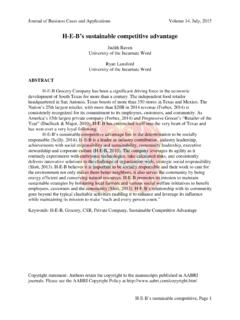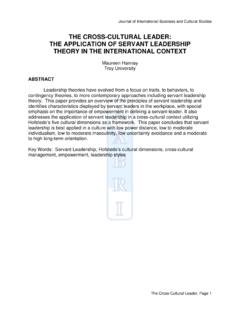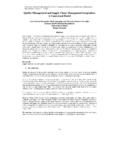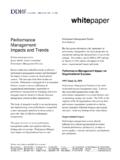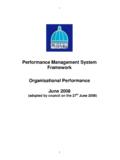Transcription of An evaluation of the effectiveness of performance ...
1 Journal of management and Marketing Research an evaluation of the effectiveness of performance management systems on service delivery in the Zimbabwean civil service P. Zvavahera National University of Science and Technology, Zimbabwe ABSTRACT. This study sought to evaluate the effectiveness of the Results Based management system in improving service delivery in the Zimbabwean civil service. The study was carried out from January 2013 to April 2013, in four Ministries. The methodology employed document analysis, open-ended questions and face to face interviews. The study found that the performance management system was fraught with challenges due to its complexity and non-adherence to its tenets by the employer. Documentary evidence showed that performance related awards had not been effected since 2007 due to financial constraints and non- submission of employees' final ratings to the Civil Service Commission for payment purposes. For a few ministries which got performance related salary increases, it was found that these were applied arbitrarily.
2 Advancements and promotions were not tied to performance . Most respondents indicated that performance appraisals were hurriedly done at the end of each year so as to fulfill the Civil Service Commission's performance requirements. It was therefore, concluded that the current performance management system was not enhancing the provision of quality service in the civil service because employees did not see any merit in its application. The recommendations were that the system needed to be simplified and employees needed to be thoroughly trained. It was concluded that the employer should adhere to the tenets of the performance management system so as to make it effective. Keywords: self-assessment, individuals work problems, continuous process, specification, evaluation Copyright statement: Authors retain the copyright to the manuscripts published in AABRI. journals. Please see the AABRI Copyright Policy at an evaluation of the effectiveness , page 1. Journal of management and Marketing Research INTRODUCTION.
3 Zimbabwe has been going through some reforms since independence in 1980, with the aim of improving service delivery in the civil service. Zimbabwe, like most developing countries, has been facing serious socio- economic challenges which led to the poor performance of the economy. The general public has been complaining about poor service delivery by government employees. Most African governments have been offering poor services to the general public (Binnendijk 2000). The Zimbabwean civil service is currently using the Results Based management System (RBM) to measure the performance of both human and financial resources. Before the introduction of RBM, the government attempted various systems such as the Public Finance management System, Mission Statements, Client Charters and the performance Appraisal System. The former performance management systems failed to yield the desired results, which is delivery of quality service to the general public. The current performance management system was introduced in 2006, and was fully embraced by all government departments in 2012.
4 Musingafi (2013) avers that this is the fourth attempt to bring some reforms to the Zimbabwean civil service since independence in 1980. He further found that the implementation of the current performance management system in Zimbabwe has been an area of controversy with regard to issues of applicability and benefits. The system is not understood and appreciated by most employees. LITERATURE REVIEW. performance management can be defined as a continuous process of improving individuals, team and organisational performance (Bussim 2012). performance management has to be the core of all organisations since it gives strategic direction and how resources are going to be distributed towards the achievement of set goals and objectives. The aim of performance management is to improve service delivery through effective and efficient application of resources. The Malaysian Civil Service Guide (2006) regards performance management as a continuous process which is aimed at improving individual performance through consistent feedback.
5 The general public is interested in better and more responsive services, which should translate to improved quality of life. Kiragu, (1998) found that poor service delivery in the civil service is caused by unskilled labour, poor compensation and poor working conditions. There has also been lack of evaluation and feedback from management . The study further cited lack of targeted training and corrupt tendencies by some senior government officials as major challenges. Patronage and corrupt tendencies were found to be some of the problems when it comes to salary increases and promotions. The Zimbabwean Government chose RBM because it covers the following critical areas; Planning (which is done collectively with all parties concerned), Results Based Budgeting (RBB) looks at the financial aspect), Personnel performance System (PPS). (evaluates the actual performance of all members in the organisation against set targets) and Monitoring and evaluation is continuous and at looks at the performance of all the above aspects.
6 Areas which need improvement during the performance cycle are also highlighted and action is taken accordingly. This approach helps the organisation with decision making. RBM integrates the human resource aspect with the financial aspect and link them to the outcomes with the aiming of improving lives of communities through provision of superior service. performance management emphasizes agreement of objectives and development needs and the importance of self-assessment and self-development. performance management focuses on the evidence provided by the analysis of what individuals and their managers did or did not do as an explanation of the results achieved. Armstrong (1991) found that an evaluation of the effectiveness , page 2. Journal of management and Marketing Research performance management provides more opportunities for individuals to discuss their work with their managers in an attractive atmosphere. An important feature of performance management is its aspect of being a continuous process and a natural aspect of management .
7 performance management systems assess performance by reference to agreed objectives. The objectives may be expressed in terms of targets, standards of performance or tasks to targets to be accomplished within a period of time based on an agreed specification. performance management gives direction to the employees through guidance from management (Medlin 2013). Managing organisations is about managing performance of people who work in organisations. The South Australian Government Guide to performance for the State indicates that governments require a result driven public sector where staff know what is expected of them and how they will be supported. This approach recognises that results are achieved through teams and there is need to have appropriate incentives in place. Inspite of the assumptions from employees that performance management does not improve performance , research found that RBM if well implemented can improve government performance (Mahakani 2012). He further found that most government employees do not clearly understand Results Based management System.
8 The problems could be lack of training and feedback from management . Planning, communication and feedback are critical elements for the success of RBM in organisations. It is believed that performance management is two-fold; firstly; organisations need to evaluate the performance of managers in achieving strategic goals and secondly, evaluate how employees through guidance from management help in achieving both organisational and individual needs. Establishment of clear links between organisational development, the delivery of quality services and the development of employees at work is important (Malaysian Civil Service Guide, 2006). The Zimbabwean Public Service Regulations of 2000 as amended in 2001 specify that all employees shall be appraised annually so as to improve the provision of services to the general public. The regulations further state that the Commission or the head of Ministry or department, as the case maybe, shall decide on what action, if any to be taken on the basis of the appraisal, including- Advancement or promotion.
9 Transfer to a post more in keeping with competence of the member concerned;. Participation in skills development courses to enhance the efficiency and effectiveness of the member concerned;. The granting or withholding of any performance award and;. Demotion or discharge subject to and in accordance with disciplinary procedures provided in Part V111. Employees' perceptions about performance management Buchner (2007) found that most employees have a negative feeling about performance management . Employees feel that the system manipulates employees without rewarding their efforts. However, research shows that if well implemented RBM can motivate employees to be more productivity. DeNisis and Pritchard (2006) aver that attitudes toward performance management affect the performance of employees in organisations. Matiza (2001) submits that performance appraisal is viewed with mixed feelings in Zimbabwe, the majority of them (2003) indicates the survival of the organisation and good service delivery is dependent on how employees perceive the whole system.
10 There should be a win-win situation between the employer and employees. Organisations are therefore, called upon to make sure that employees' benefits are tied to performance and the system has to be regarded as fair and just by the employees. It is also an evaluation of the effectiveness , page 3. Journal of management and Marketing Research critical for management to gauge the effectiveness of the system through analyzing the attitudes and behaviours of their employees Benefits which can accrue from good performance could be either in the form of bonuses or salary raises (http://. ). performance management allows continuous improvement, promotes learning and professional development and facilitates engagement and rewarding for employees ( ). The benefits of Results based management system Results based management system has many benefits to the public service. The approach allows employees to come up with clear goals and objectives. When employees create their own work plans, they become responsible and committed to achieve them.

